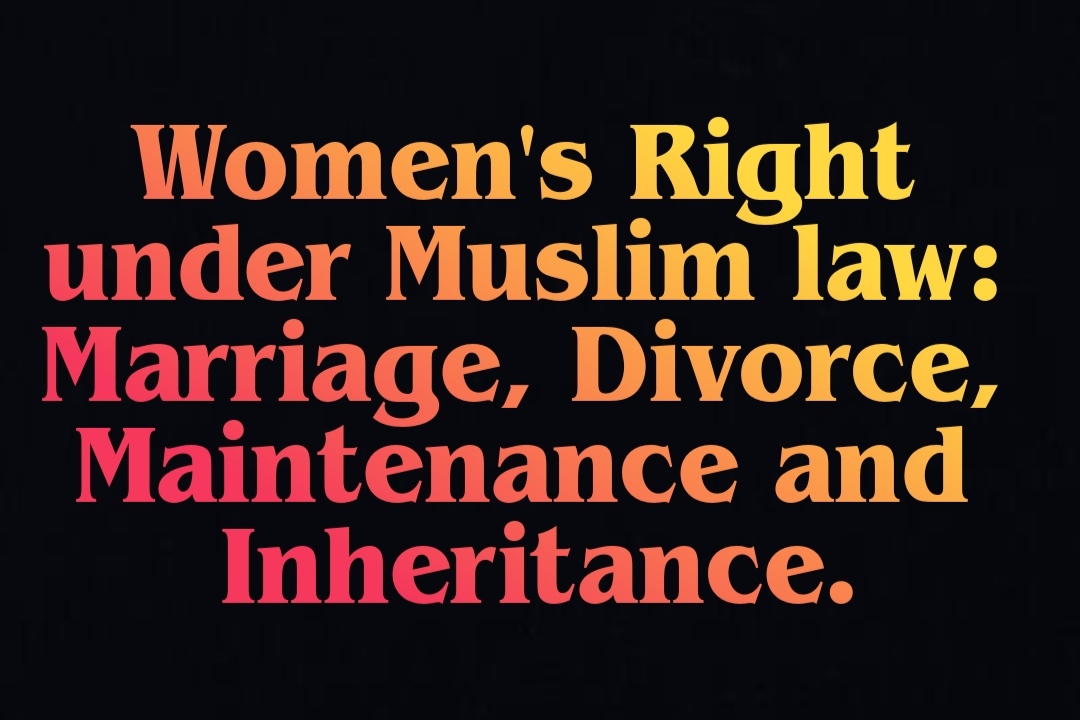Summary
Different personal laws govern different religions, the issue of women’s rights in Muslim personal law is very controversial as women have been fighting for gender equality rights relating to their property rights, maintenance, divorce, and marriage. In this article, we are going to discuss the exposition of the Rights of Muslim women.
Introduction
According to the census report of 2011, there are more than 84 million Muslim women in India. Indian Constitution has assured equality and freedom from unfairness based on sex or religion, but still, various practices are based on different personal laws. Indian Muslims are governed by their personal law or the Muslim Personal Law (Shariat) Application Act, 1937. The status of women in various human social orders of the world is extraordinary, they are makers of life but the situation with women in the public arena is neither another issue nor is it a completely settled one. Muslim women are battling for sex uniformity in the Islamic law that supervises rights identified with marriage, separation, and property rights for a very long time.
Women’s right in marriage under Muslim law

Under Muslim law, marriage is an agreement between two parties. It is viewed as an important and sacred union between a man and woman that fulfills half of one’s religious obligations The foundation of marriage has three aspects:
- Legal
- Social
- Religious
In Muslim law, the emphasis is given to mutual respect and love between the husband and the wife. Although Islam provides many rights to women regarding marital issues, cultural traditions can greatly influence the proposal and acceptance process beyond the Islam requirements and, in some cases, directly contradict Islamic practices. Under Muslim marriage, brides are entitled to a dowry that is typically negotiated at the same time as the marriage contract. The dowry is specifically a gift showing love and devotion to the bride. There are two types of dowries a bride is entitled to:
- the mahr
- the muakhr
Muslim wife maintains her distinct individuality even after marriage and she never assumes her husband’s name.
Women’s right to divorce and maintenance under Muslim law

If the marriage ends, women’s property is not divided. However, the men’s property is divided during a divorce. This was done to protect women’s rights. A woman is also entitled to maintenance and support from her former husband. There are also special instructions if divorce occurs before the marriage is consummated and before or after the dowry is set. If the marriage was consummated, the wife may marry a further person after the completion of iddat and if the marriage was not consummated; she is liberated to marry immediately. Determining the proper procedure for divorce is highly dependent upon the timing of the divorce, the reasons for divorce, the client’s Islamic School of Thought (Hanafi, Hanbali, Maliki, and Shafi), whether he or she is Sunni or Shiite, and the circumstances surrounding the divorce.
Women’s right to inheritance under Muslim law

Women can receive an inheritance, not only as daughters but as wives and mothers too. However, the property share of men is double the share of women. If a Muslim widow is childless, she is entitled to one-fourth of the property of her deceased husband. But ff the widow has children and grandchildren; her share of the property is one-eighth of the deceased husband’s property. In case there is more than one wife, her share of property may come down to one-sixteenth.
In case of divorce, If the woman has a deferred Mehr, she will have all rights upon it after the divorce. And if the woman is divorced and has a minor child, she can ask for maintenance from her former husband under Section 125 of the CrPC, until she remarries.
In the case of the mother’s right over her children’s property, if the deceased son did not have any children of his own, his mother’s share would be one-third. However, if the deceased son has children of his own, the woman’s mother is entitled to one-sixth of her deceased son’s property.
A Muslim woman’s child in her womb is an eligible heir for the property if it is born alive, as it is considered as a living being. However, if the child in the womb is not born alive, the share is null and void and it is considered that there never was any heir.
Landmark Judgements
Mohd. Ahmed Khan vs Shah Bano Begum And Ors, 1985
In this case, the Supreme Court held that Section 125(3) of the Code of Criminal Procedure applies to all citizens independent of their religion and is pertinent to Muslims as well, without any sort of discrimination. The court further stated that Section 125 overrides the personal law if there is any conflict between the two It makes clear that there’s no strife between the provisions of Section 125 and those of the Muslim Personal Law on the address of the Muslim husband’s obligation to provide maintenance for a divorced wife who is incapable to maintain herself.
Ahmedabad Women Action Group (AWAG) vs Union of India, 1997
In this case, the court held that India and Indians have been governed by personal laws, regardless of the time. It believed that interference by the court would lead to several undesirable outcomes, as the adjudication of personal laws was beyond the jurisdiction of the courts.
Danial Latifi and another vs Union of India, 2001
In this case, the Supreme Court held that a Muslim husband is liable to make reasonable and fair provision for the future of his divorced wife extending beyond the iddat period. It was established for the first time that a Muslim husband’s liability to provide maintenance to his divorced wife extends beyond the iddat period, and he must realize his obligation within the iddat period, thereby striking a balance between Muslim personal law and the Criminal Procedure Code, 1973.
Shamim Ara v. State of U.P., 2002
In this case, the Supreme Court held that a simple plea of talaq in answer to the procedures filed by the wife for maintenance can’t be treated as a proclamation of talaq and the responsibility of the husband to pay maintenance to his wife doesn’t conclude such correspondence. For separation to be substantial, talaq must be articulated according to the Quranic injunction.
Shayara Bano v. Union of India and others, 2017
In this case, the Supreme Court took a landmark decision on the constitutional validity of “Talaq-e-Biddat” popularly known as “Triple Talaq” which is one of the three male-initiated divorces in the Muslim community. It led to a ray of hope for millions of women who have suffered because of this immoral and unfair practice.
Conclusion
The status of Muslim women has been raised in a society with the advent of different laws that are made to protect Muslim women. They are given the liberty to choose their partner, her consent is very important in the validity of a marriage. The Muslim laws have accepted women as free and responsible members of society. Judiciary has played an important role in the upliftment of women. The Supreme Court’s landmark judgement on triple talaq gave a ray of hope for millions of women who have suffered because of this immoral and unfair practice.
Frequently Asked Questions (FAQs)
What are the rights of the married woman in Muslim law?
According to Islam, both men and women have rights over each other when they enter into a marriage contract, with the husband serving as protector and supporter of the family most of the time, from his means.
Do Muslim women have property rights?
Both men and women are equal as per the law of inheritance and there is no preferential treatment imparted to either. Women can receive an inheritance, not only as daughters but as wives and mothers too. However, the property share of men is double the share of women.
Can a married daughter claim her father’s property?
Under Muslim law, the rules of inheritance are rather strict. A son takes double the share of a daughter, on the other hand, the daughter is the absolute owner of whatever property she inherits. If there is no brother, she gets half a share. It is legally hers to manage, control, and dispose of it as and when she wants.
What are Muslim’s woman rights to the property of the child in her womb?
A Muslim woman’s child in her womb is an eligible heir for the property if it is born alive, as it is considered as a living being. However, if the child in the womb is not born alive, the share is null and void and it is considered that there never was any heir.
Do Muslim men have an upper hand in succession over women?
The quranic interpretation shows that both men and women are equal. However, sometimes Muslim men may have an upper hand. As per the inheritance rules, a son’s share is double that of his sister, because the sister is also entitled to a Mehr through her marriage.
What was held in the Shayara Bano vs Union of India case?
In this case, the Supreme Court took a landmark decision on the constitutional validity of “Talaq-e-Biddat” popularly known as “Triple Talaq” which is one of the three male-initiated divorces in the Muslim community. It led to a ray of hope for millions of women who have suffered because of this immoral and unfair practice.
